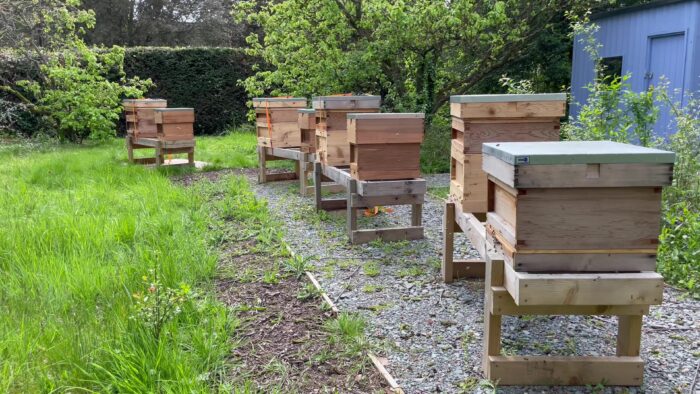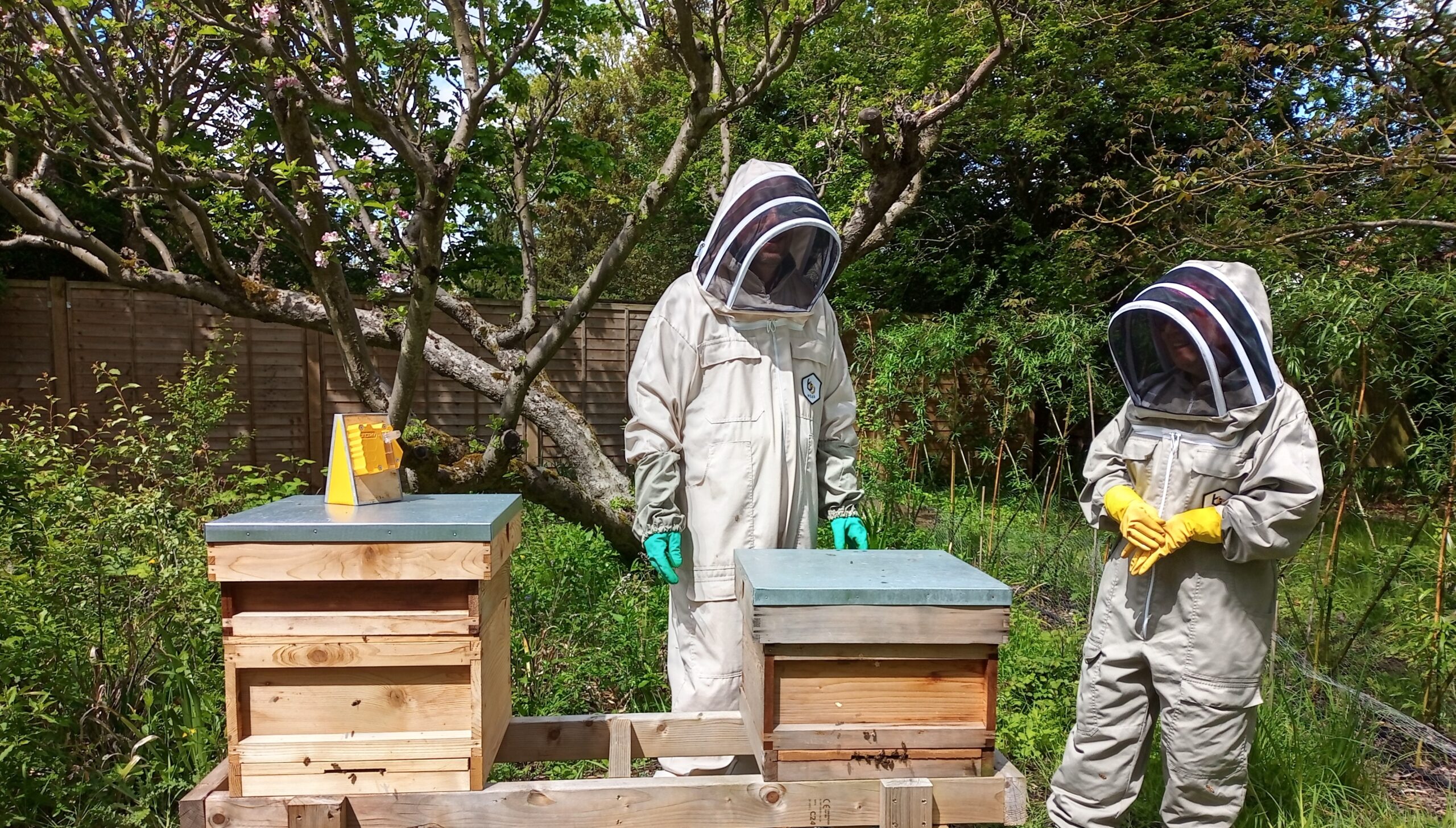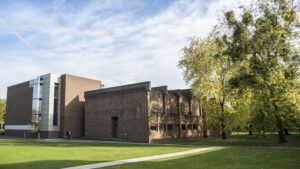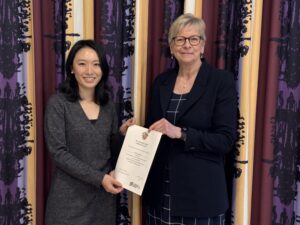Churchill’s beehives first arrived seven years ago courtesy of a local beekeeper. In 2020 the grounds & gardens team were given the opportunity to take over their care, and keen to take up the challenge, John Moore and Nicki Meidlinger joined the Beekeeper’s Association, signed up for a beginners’ course and haven’t looked back since!
We caught up with John and Nicki earlier this month to find out more about the College bees and watched the team in action as they showed us round some of the hives, including a home for native buff-tailed bumblebees and a newly installed solitary bee hotel. Watch the video below!
Honey production at Churchill
Last year there was a spring harvest of 30lb and an early summer harvest of 60lb and the Churchill honey they extracted was made available to purchase from the College dining hall! John and Nicki are hoping for an even better harvest this year as they are starting with more colonies which are looking healthy and building up well, but a lot will depend on the weather as a hot, dry summer reduces the available nectar.
As Nicki explains, the taste and texture of the honey changes at each harvest, depending what the bees have found to forage on. All pure honey will granulate and this is the best proof of its quality; ‘Our honey is extracted straight from the comb then filtered twice through sieves which removes bits of wax and pollen before being placed into jars once settled. The main harvest is in late summer/early autumn and we often have a spring crop thanks to the farms close by where rape seed oil is grown. It is an early nectar crop and the bees go crazy for it, but it granulates quickly so we have to extract at the right time or it will set solid in the comb. We can then ‘cream’ the honey which controls the granulation and makes a smooth soft-set honey.’
Last autumn, John and Nicki sent samples of honey taken straight from the comb to the National Honey Monitoring Scheme for DNA analysis. The analysis shows the species of pollen present and any pesticide residue. The scheme uses this information to identify possible threats to bees and other pollinating insects and we get to know which flowers the bees were foraging on last summer. The samples are also archived for future research.
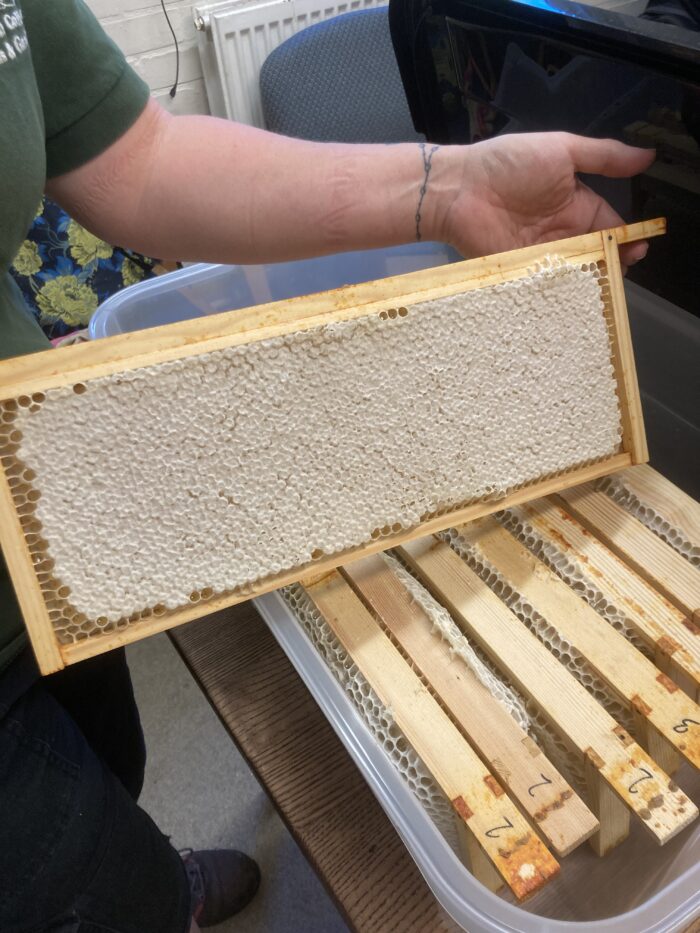
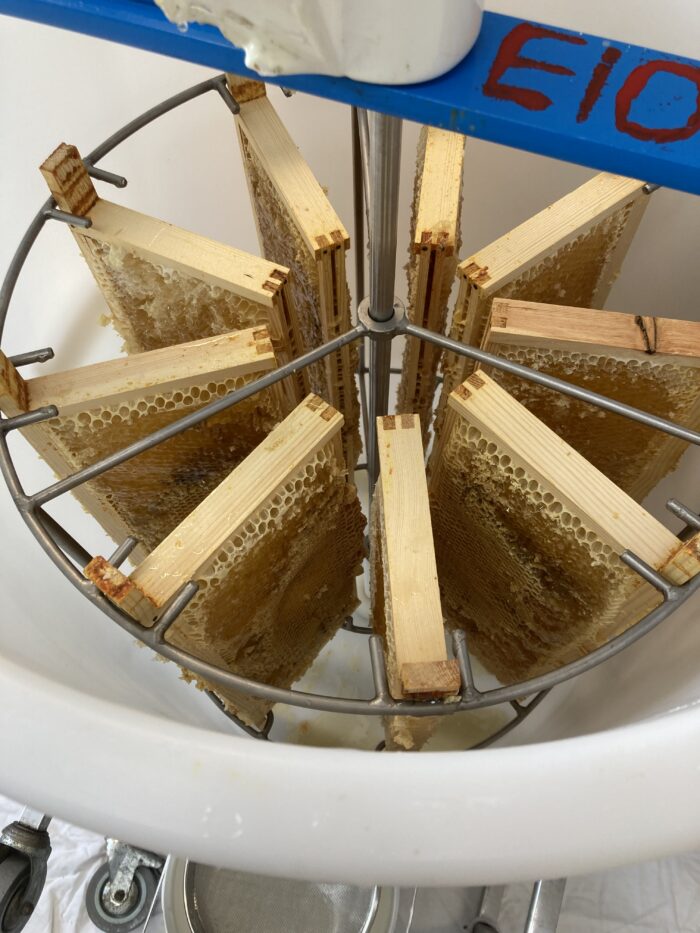
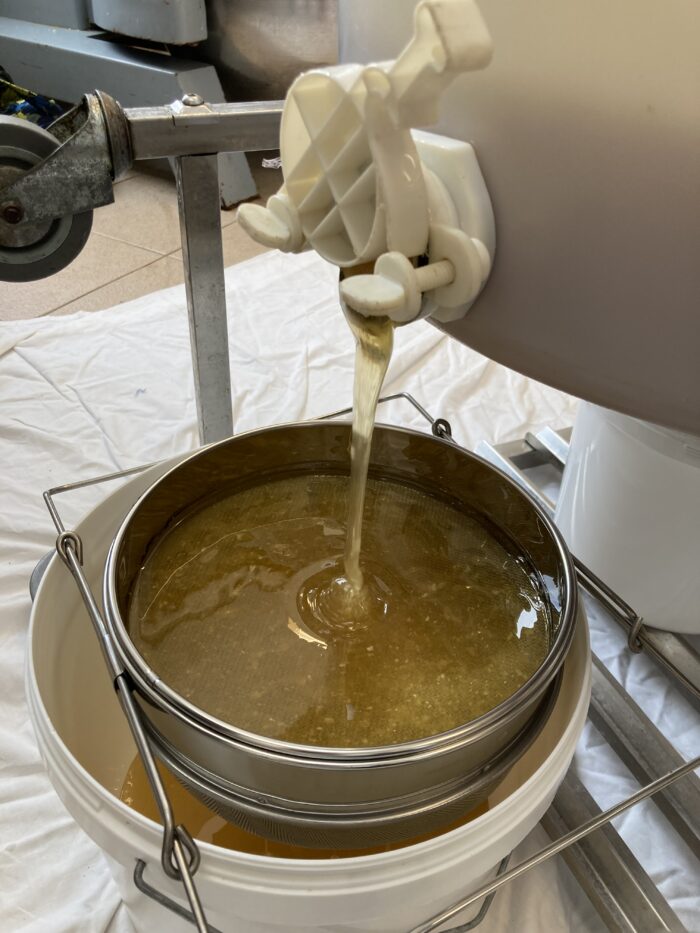
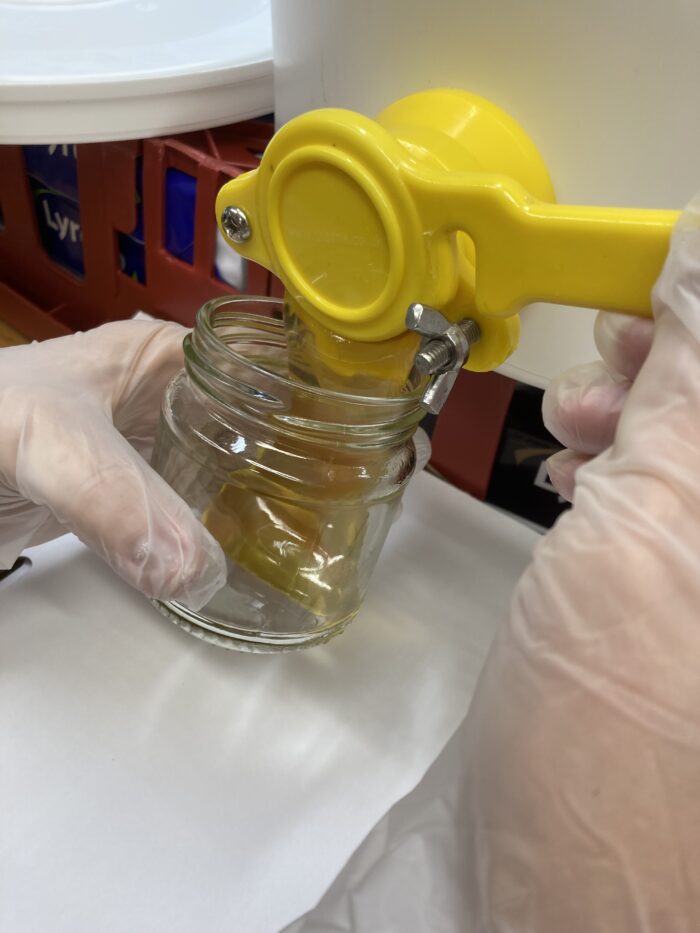
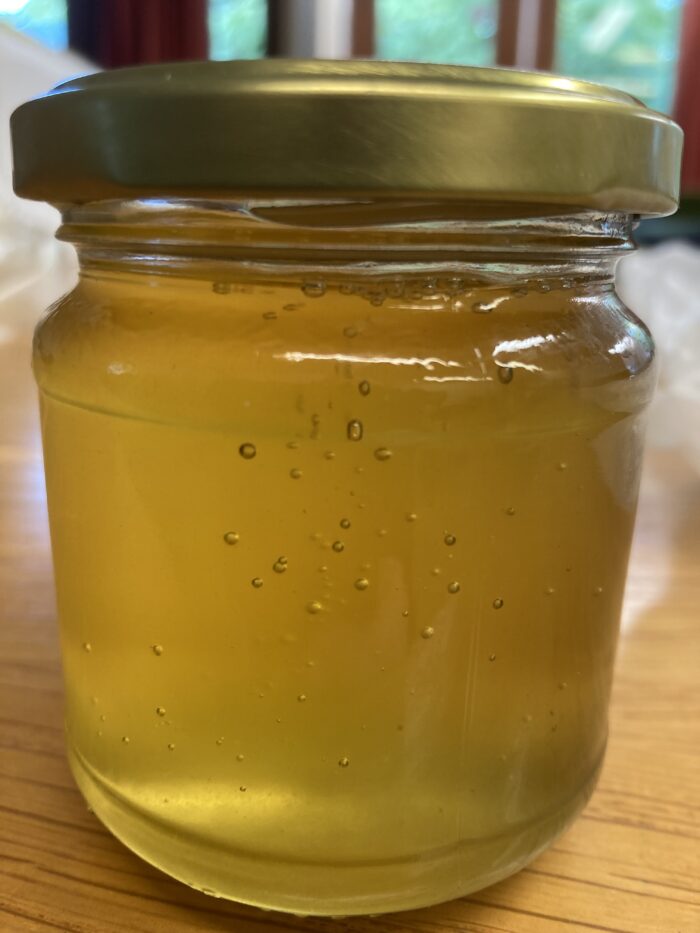
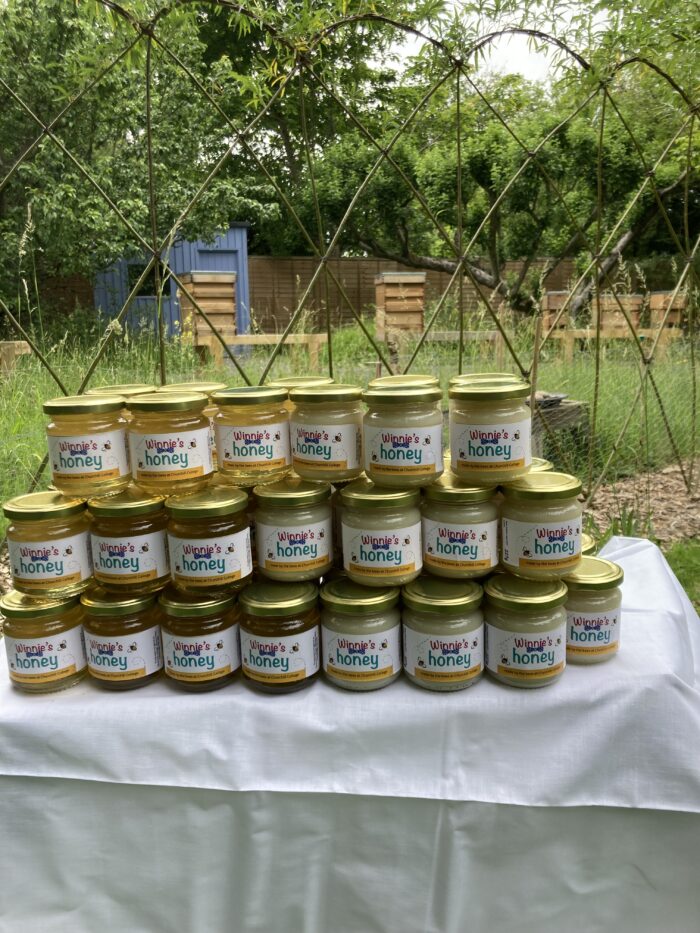
The benefits of keeping bees at College
There are lots of positives about honeybees, not just the delicious honey and the benefits of pollination. They are fascinating insects and can help people engage with the natural surroundings they live in, particularly in urban areas. There are wellbeing benefits too, it’s relaxing to just watch bees going about their business – from a safe distance obviously.
Most importantly, learning about and keeping bees has raised awareness of the importance of providing food for all pollinators and increasing biodiversity on the site and this is influencing how the team garden; from the type of plants they choose to how they maintain the grounds; ‘We haven’t used total weedkillers or pesticides since 2014/15 except for on the sports pitches where selective treatment has been reduced to every 2-3 years. We know there is still a lot more we can do.’
The grounds and gardens team started by adding pollinator-friendly plants and trees around the site such as along the perimeter path which has been planted with 1000s of native wildflowers, bulbs and an avenue of crab apple trees, as well as leaving areas of the grass along the path to grow long for most of the year. This year they are extending this planting area and they have recently installed a bumblebee villa with a colony of buff-tailed bumblebees and a solitary bee hotel!
We are looking at areas we can leave more relaxed and informal to encourage pollinators, other insects and mammals onto the site which ties in with our activities for the Hedgehog Friendly Campus scheme. We are introducing habitats such as log piles, bug palaces and solitary bee hotels
The beekeeping year

FAQs
Why are inspections needed?
When inspecting we are looking for signs the queen is still laying, the colony is healthy with a good temperament, there is enough space in the hive for the bees to store honey and the bees aren’t under stress from pests or disease. When the weather starts to warm up the colony expands quickly so we put plans in place to prevent and control swarms. May to June is the main swarming season and the weekly inspections are very important; any longer between inspections and the colony can make a new queen and swarm with the old queen taking over 50% of the bees with her.
How long do bees live?
A worker bee only lives for around 5 weeks during summer as they work so hard whereas winter bees live up to 6 months and the queen 3-4 years. As for male drones, they can live for about 90 days but essentially if they mate, they die, and if they don’t mate they are evicted from the hive at the end of summer / early Autumn and then die. You can find out more about drones here: The life of drones
What happens to the hives and the bees over the winter?
In late autumn we treat for mites, add insulation to the roof of the hives, reduce entrances to stop mice moving in for winter, secure the hives so they can’t be blown over and cover them with a cage to keep the green woodpeckers away. Then we leave the bees to it, with minimal interference until the following spring. The bees will spend most of the winter inside the hive, only going outside for ‘cleansing’ flights on warmer days. They cluster together to keep warm with the queen at the centre and the worker bees taking turns to be on the outside. The bees can’t forage during winter so to check they have enough food we regularly ‘heft’ the hive; this means lifting each side to feel how heavy it is. When the hive is easy to lift we add fondant just in case.
Where can you buy the honey?
Honey will be available to buy in the dining hall. If we get a spring harvest the honey will be available around July, the main harvest will be available around September.
Next steps!
This year John and Nicki hope to offer students and staff a ‘bee experience’ where they give a small group of 3 or 4 people an overview of what a colony consists of and how it works in the hive, followed by a look inside a hive. If it is possible, it will be available through June and July, weather permitting. They are still working out the details but will confirm this as soon as they think we can make it work.
They will also be taking further practical classes with the aim of sitting the British Beekeeping Association Basic Assessment later in the year. They also hope to start raising their own queen bees using the best of ours to make sure all our colonies are as strong, healthy and well-behaved as possible.
